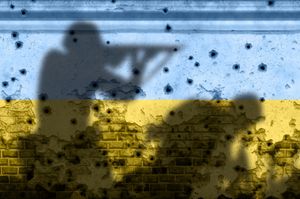War in Europe

Last week, Russia invaded Ukraine, starting the biggest war in Europe since the end of World War Two. Russian forces, in large numbers, attacked from the north, east and south, coming by air, by sea, and over land.
The Russian President, Vladimir Putin, has long complained about the expansion of NATO toward Russian territory. According to Putin, the prospect of Ukraine joining NATO is a threat to Russian security. He has also argued that Ukraine is rightfully a part of Russia.
Ukrainians are determined to defend their country. The Ukrainian President, Volodymyr Zelenskyy, is visible in the media and has made frequent requests to the international community for help. The Ukrainian military called up reservists aged 18 to 60, and along with the air force, has been slowing the Russian advance. Ukrainian civilians have moved into subway stations and bunkers for protection.
People have expressed shock at the outbreak of war in Europe after a long period of peace. The European Union, the United States, and other countries have reacted with financial sanctions on Russian banks, certain industries, and key individuals. As well, several countries are sending supplies and weapons to assist Ukraine. However, not wanting to directly go to war with Russia, other countries are not sending their own soldiers to fight alongside Ukrainians.
There have already been civilian and military deaths in the conflict, and there are expected to be many more. An already tragic situation has the potential to become far worse if other countries join the conflict, especially considering Russia is a nuclear-armed power.
Sources: bbc.com, aljazeera.com
For source links, see the article on ESLNewsStories.com
Audio
Hear the article spoken:
Useful Language
- Invade (v) - to enter a country to take control with force
- Forces (n) - groups from the army, navy, or air force
- NATO (n) - a military alliance made up of many of the countries of Europe plus the United States and Canada (North Atlantic Treaty Organization)
- Prospect (n) - the possibility that something will happen
- Determined (adj) - strongly feeling that you want to do something
- Call up (phr. v) - to order people to join the military or report for active duty
- Reservist (n) - a soldier that is ready to fight if needed
- Advance (n) - forward movement
- Bunker (n) - a strongly built shelter, often underground
- Sanction (n) - an official order to limit trade with a country
Discussion
Discuss the following questions with your partner(s).
- How do you feel about war?
- When was the last war or serious conflict that affected your part of the world?
- Do you know any Ukrainians or people in Ukraine? How are you feeling about their situation?
- Is a peaceful solution to conflict always possible? Or is war sometimes unavoidable?
- President Putin seems to think that Ukraine should not be an independent nation. Does he have the right to say this? Is history on his side?
- Smaller countries can be threatened by larger neighbors. What can smaller countries do to improve their security?
- Is 18 years old too young to fight in a war? Is 60 too old?
- Will Russia be strongly affected by financial sanctions? Are they enough to make Putin reconsider this war?
- Do you support your country sending weapons or supplies to Ukraine? Why or why not?
- Have you thought about the threat of nuclear war? How possible is it?